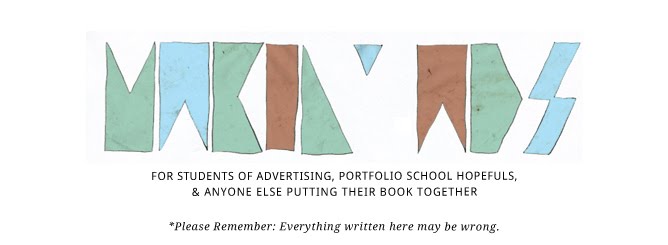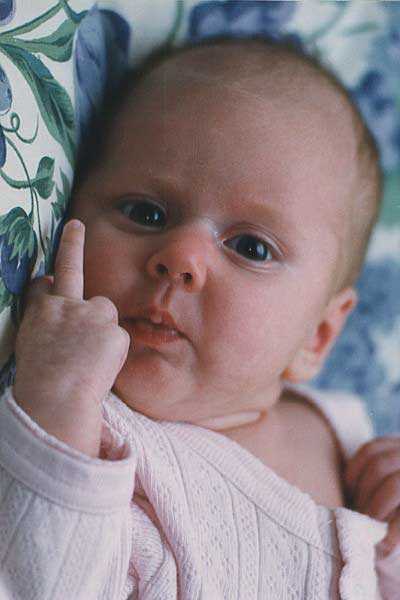Thanks for the opportunity to share my thoughts about portfolio schools. As Director of Student Affairs for the VCU Brandcenter, my POV may be a bit biased but hopefully some of this advice will be helpful. I’ll start by saying a few quick things about the VCU Brandcenter (I can’t help myself!) and then I’ll focus on portfolio schools in general.
The first thing our faculty, students, and alums will tell you about that Brandcenter is that we don’t consider ourselves to be a portfolio school. The Brandcenter is a comprehensive graduate advertising program focused on creativity, commerce (remember, advertising is a business!), collaboration, and culture. We have five tracks (Copywriting, Art Direction, Strategy, Creative Brand Management, and Experience Design), and while the students work together in cross-functional teams, each student develops an expertise in his/her individual track. Assignments at the Brandcenter are as realistic and practical as possible including actual "real world" assignments from companies like Google, Barnes & Noble, Audi, and HBO who've asked Brandcenter students to work on some of their most challenging marketing issues. Students are supervised by full-time faculty who’ve all had successful careers as Creative Directors, Planning Directors, Agency Presidents, Designers, Directors, and Editors. Most of our faculty members continue to work or consult in their field in addition to teaching. Brandcenter students earn a Master of Science degree in Business/Branding from Virginia Commonwealth University. Our students tell us the Master’s degree is important to them, more for the long-term, as it may give them an advantage if they choose to take on management roles or teach at the college level in the future. All of that said, the VCU Brandcenter is often included in the portfolio school “category" b/c all of our students (brand management, strategy, creative, and experience design) graduate with portfolios that showcase their strategic and creative thinking abilities. Our copywriters and art directors are often competing for jobs against graduates of Miami Ad School, Creative Circus, Chicago Portfolio School, and Portfolio Center. So, if you’re thinking about attending one of these schools, here are the questions I would ask each portfolio school you apply to (and if they don’t have the answers, that’s a red flag!)
QUESTIONS TO ASK OF PORTFOLIO SCHOOLS YOU ARE APPLYING TO:
Answers for the VCU Brandcenter are below each question so you’ve got one school’s answers already!
1.) What is your school’s job placement rate? (That’s why you’re going back to school, right? Most students go to a portfolio school to get a job in advertising vs. to continue on with a Ph.D in advertising.)
The VCU Brandcenter’s job placement rate is consistently 97% within 6 months of graduation. Here’s a more detailed breakdown of job placement rate using the Class of 2015 as an example. For reference, they graduated on May 9, 2015.
Job placement by graduation (May 9) = 25%
Job placement by June 1st = 56%
Job placement by July 1st = 83%
2.) Can I see a list of where your most recent grads got jobs? (It’s important to see which agencies/companies currently recruit from the school. Who will be recruiting YOU when it’s time for you to graduate?)
Here’s a list of where the VCU Brandcenter Class of 2015 is getting jobs. All of the best agencies are on the list but it’s also important to note that brands like Facebook, Apple, Google, IBM, Coca-Cola, Capital One, Nike, etc. are also recruiting Brandcenter students and alums.
3.) What does the school do to help students get jobs? (Your portfolio/work is important but so are the connections your school has to the industry.)
The Brandcenter hosts a Recruiter Session event each April for recruiters to come meet our graduating students. Over the past 5 years, we’ve consistently had 200+ recruiters from the best agencies in the country attend our event. That’s more than a 2:1 ratio of recruiters to students! Check out who attended in April.
4.) Can I see the portfolios of your most recent grads? (Look at the “end product” of your investment. Check out the graduates’ portfolios. Are you impressed by their work? Are you envious of their portfolios? Hopefully, the answer is “yes!")
5.) What does the school do to help students get summer internships? (I’m sure most grad programs talk about internships, but how many curate the opportunities and facilitate the application process for you?)
During the summer between the 1st and 2nd year of the Brandcenter program, the school facilitates PAID internships at some of the best agencies/ companies all over the US. We curate all the available opportunities and our students can search the opportunities by agency/company, location or job title. You can see where the Class of 2016 is interning this summer here. Internships are a great way to apply what you learned in school in the real world and make valuable industry connections.
6.) Who are your faculty? (How many of them are full-time vs. adjuncts who have other full-time jobs? How many of them actually worked and/or continue to work in our industry?)
7.) Do you have salary data for your alums? (You are making a huge investment in yourself and the school you choose to attend. What’s the ROI (return on investment) going to be?)
8.) Why do recruiters and creative directors say they like to hire graduates from your school? (What recruiters and CDs think about the school is important. They are the “gatekeepers” to your dream job.)
9.) Do you stay engaged with your alumni? (Again, grad school is an investment so make sure you choose one that will “pay dividends” long after you’ve graduated.)
Your relationship with the VCU Brandcenter doesn’t end when you graduate. Being that we are a small, elite program, we stay in close touch with our alums. And, our alums stay in close touch with each other helping one another interview, network, etc. We keep a job postings board for our alums so they have access to the newest job openings from agencies and companies all over the world. We also feature the work our alums are doing and we share their work and accolades with our industry contacts. Check out a few of these recent projects from our alums.
10.) Why do so many Brandcenter alums end up marrying each other?
I have no idea but it’s one of my favorite “statistics” about our students/alums. We always joke that we should make our recruiting strategy something like, “Come to the Brandcenter to get an amazing portfolio and job + find your soulmate.”
Makinads is an amazing resource so keep reading what these guys have to say. You may also want to check out books like Pick Me (by Nancy Vonk and Janet Kestin) and Hey Whipple, Squeeze This (by Luke Sullivan) and Breaking In: How to Build a Portfolio that Will Get You Hired (by Burks Spencer.) Good luck to all of you as you pursue careers in advertising! Hopefully, I’ll see some of you at the VCU Brandcenter one day!
Ashley Sommardahl
Ashley Sommardahl
VCU Brandcenter / Director of Student Affairs and Industry Outreach / 804-827-8874 direct / 103 S. Jefferson Street, Richmond, VA 23284








